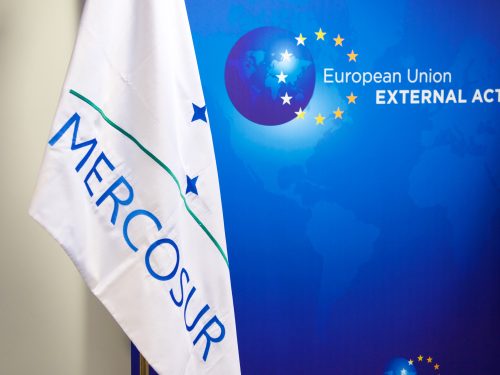News
Hearing on the draft legislative decree on the Public Contracts Code
Monday 30 January 2023
Share on
Today the Director General of Confindustria, Francesca Mariottiintervened in hearing at the Environment Commission of the Chamber of Deputies as part of theExamination of the draft legislative decree on the Public Contracts Code.
The policy strategy contained in the outline of the Public Contracts Code (hereafter CCP) must be based on effective actions, definite timeframes for implementation and incisive interventions to boost investments, including those in the NRP.
Being within the framework of the reforms required by the Next Generation EU, the current reform of the Code must create the conditions for a increased spending capacity of public resourcesbut also a capacity to invest in the country's technological, digital and sustainable transition.
As a preamble, we express our appreciation for a fundamental choice: to precede the articulation of the institutions by a framework of principles and to return the Code to its function as a tool for acquiring, on the market, goods and services, overcoming "heterogenies" dictated by purposes such as the fight against illegality or corruptive phenomena, which are in themselves fully shareable, but which cannot be solved by procurement rules.
On the merits, we first consider it appropriate to point out that service and supply contracts assume, in this context, an extremely significant importance in the national economyboth because of their economic value and in view of their strategic importance for the functioning of the public administration and its provision of services also to businesses.
Considering that the reform is aimed at restoring simplicity and clarity of language to the codified provisions, we consider it necessary to intervene here so that public contracts relating to services and supplies have their own specificity and their own reference in the regulations and simplification criteria. In this direction, it would be useful to at least begin work on separating the application between sectors that are totally different from each other and whose regulatory repercussions can be very different and even create real 'application problems' in some cases.
Therefore, ad-hoc legislation for service contracts, to be integrated into the Code, appears to be disregarded but remains a highly desirable and necessary requirement.
GENERAL ASSESSMENTS AND PROPOSALS
The text appears clearly structured and readable. It is clear that the aim was to adapt the regulation of public contracts to that of European law, to the principles expressed over the years by case law and, above all, to restore the organicity and systemicity that had been lost as a result of the continuous amendments introduced.
Ė positive that the new Code contains many 'self-executing' rules, without references to other legal texts.
At the same time, it would be limiting to assess the Code's effectiveness solely on the basis of its ability to speed up procedures to unlock public investmentTo revive the economy of our country-system, the focus cannot only be on 'how much I buy', but also and above all on 'what I buy'.
The new Code should set up a reference framework through which all economic actors are put in a position to support the indispensable digital, technological and sustainable transition: these are the pillars from which any reasoning must necessarily start and which must guide and inspire the principles and discipline of the new Contracts Code. The technological and sustainable transition requires prudent and farsighted purchases and investments calibrated to the PA's innovation needs.
Going into the substance of the measure, they are four main points of attention regarding the revision pathway and implementation of the public procurement reform:
- it is necessary for contracting stations and economic operators to have a scomprehensive and immediately implementable system of rules;
- it is desirable that a congruent period of stability of the regulatory framework procurement;
- the possibility of move forward the entry into force of the Code, scheduled for 31.03.2023. Regulatory shock must be avoidedan excessive discontinuity from the NRP, at the moment of its maximum implementation, which would risk slowing down, if not blocking the execution of the works. A vacatio legis of 12 months, negotiated with the European institutionswould enable all operators to become familiar and aware of the new and would be a common sense measure in view of the prompt implementation of the NRP;
– design and above all implement a true governance model of the Procurement Code which is able to carry out a constant review of the state of implementation of the rules and of any difficulties that contracting authorities may encounter in the application phase, is also essential for proposing corrective and improvement solutions.
Below are the timely observations to the articles on certain topics considered as priorities:
1. Positive profiles
DIGITISATION
The push for digitisation appears to be the central element of the new Code and an indispensable tool to achieve effective simplification of procedures.
Confindustria has always maintained that in order to spend more and spend better, it was necessary to have structured public organisations with competent staff - to be implemented through the Qualification of Contracting Stations - and digitise the entire procurement and contract management process with efficient technologies and systems capable of handling interoperable and easily accessible data.
However, we point out that several contracting stations report that the innovation is currently a half-hearted exercise, in the absence of interoperability and anti-mafia regulations.
QUALIFICATION OF CONTRACTING STATIONS AND CENTRAL PURCHASING BODIES (ART. 63)
This is where one of the most eagerly awaited reforms, so often called for by Confindustria, is at play. The aim of the measure, envisaged moreover by the current D. Legislative Decree 50/2016 and never implemented, is to curb the excessive fragmentation as well as the organisational and professional deficits that characterise the landscape of contracting stations.
It is therefore not a question of reducing the number of contracting stations in order to penalise those administrations that will not be able to qualify, but of concentrate activities in an adequate number of organisations who are able to have trained staff, efficient processes and procedures, technical and not just administrative skills, and digital technologies to support the entire procurement lifecycle.
The fear, however, is that we risk a progressive 'watering down' of the objective of qualifying contracting stations.
2. Critical aspects
PROCEDURES FOR PROCUREMENT (Art. 50)
The stable raising of the thresholds for direct contracting to EUR 140,000 for services and supplies is a change that we take a negative view ofas these thresholds are, in essence, to the detriment of small and medium-sized enterprises in particular, which can more easily participate in small tenders.
The principle of efficiency and results is pursued by reducing litigationby facilitating the rotation of contractors in the various phases, by setting up validity paths for procedures with only one competitor, not by abolishing competition at the outset.
For the services and supplies, including engineering and architectural services, it is considered appropriate to reduce the threshold of EUR 140,000 to EUR 80,000to better safeguard the transparency of contract awards.
PRICE REVIEW (Art. 60)
The introduction of price revision clauses must aim at rendering the principle of contractual balance effective.
On this point, the draft decree takes a significant step forward, overcoming - on the one hand - the uncertainty surrounding the inclusion of revision clauses in contracts by providing for a generalised price revision obligation in all sectors (works, supplies and services) and - on the other - introducing among the general principles preceding the code that of the 'preservation of contractual equilibrium'.
The first critical aspect is the identification of a significance threshold of (5%), which is considered excessively high for all types of public contracts, i.e. works, services and supplies.
That said, in concrete terms, while accepting the principle of normal risk, we consider it necessary that identify appropriate thresholds for access to price revision taking into account the specific needs of all sectorsespecially of those contracts of long duration and indexed to ISTAT or ANAC values, which vary but not so significantly.
It can be observed, in fact, that in the ordinary manner to which we were accustomed, the ISTAT indices - such as, for example, the FOI - change, but with percentages of 1%, 2%, and only in extraordinary cases, such as those occurring at the turn of 2021 and 2022, do the indices show more significant increases.
The other aspect that gives rise to concern concerns concerns the reference to the 'synthetic indices (...) approved by ISTAT with its own provision by 30 September of each year', which are to be used for the survey of price changes. What is feared, among other things, is what is pointed out in the illustrative report, namely that ISTAT - although it guarantees adequate impartiality and impartiality, as well as authoritativeness, in its surveys - is not currently in possession of the data necessary to guarantee effective mapping in all sectors, including those of services and supplies. For the latter, the real risk is of a de facto non-application of the new rules.
CAUSES OF EXCLUSION (Arts. 94- 95)
The scheme regulates the cases of exclusion of economic operators in the presence, inter alia, of tax violations that have been definitively established and are not final. In this regard, we note that the provisions contained in Articles 94 and 95 of the outline of the decree, as well as Annex II.10 thereto, substantially reproduce the structure of the former Procurement Code (in conjunction with Article 80, paragraph 4 of Legislative Decree No. 50/2016 and the Ministerial Decree of 28 September 2022 concerning non-final tax violations).
This choice, while on the one hand allowing companies an easier transition to the 'new' Procurement Code - also in view of the stringent timeframe for the entry into force of the discipline - represents, however, a significant step forward, a missed opportunity to overcome pre-existing criticalities and bring Italian procurement regulations into line with the provisions of the European directives (Directives 2014/23/EU and 2014/24/EU).
First, in fact, the reference to the threshold of seriousness for definitively ascertained violations of €5,000 (pursuant to Article 48-bis, paragraphs 1 and 2-bis, of Presidential Decree No. 602/1973) is confirmed, a significantly low amount that raises serious doubts as to compliance with the principle of proportionality.
One could have followed the solution adopted with regard to non-final violations, where the legislator more correctly identified this threshold of seriousness as a percentage of the value of the contract (10%) in order to enhance the ratio of the rule to protect those entities that present profiles of reliability and financial solvency adequate for the proper execution of the works.
On the other hand, with reference to the aforementioned regulation of non-final violations (Article 95(2)), the phrase "the contracting authority shall exclude" should be changed, as it is not consistent with the regulation of "optional" grounds for exclusion: it is, in fact, up to the contracting authority's discretionary assessment, according to a judgment of proportionality, even in the presence of exceeding the aforementioned threshold, to decide on the exclusion of the economic operator from the tenders.
For these reasons, we propose to provide - for both final and non-final violations - exemption from the exclusion rules in the event that the operator provides evidence that the measures it has taken are sufficient to demonstrate its reliability pursuant to Art. 96(6) (so-called self-cleaning clause).
Remaining on the subject of non-automatic exclusion clauses, the draft decree also contemplates the hypothesis that the economic operator has committed a serious professional offence, proven by the contracting authority by appropriate means. In this regard, it is envisaged that, for the purposes of the relevance of the professional offence, even its mere contestation may be sufficient and, among the cases considered, all the predicate offences of the administrative liability of entities, pursuant to Legislative Decree No. 231/2001, are also included.
In this regard and beyond the broad and generic reference to all offences 231, it should first be noted that the EU Directive requires, for the purposes of exclusion, that the economic operator be guilty of a professional offence. Therefore, contemplating the possible exclusion even in the presence of the mere accusation of the offence, constitutes an extension of the discipline with respect to the perimeter traced by the European act, in addition to raising some doubts as to compliance with the general principle of innocence.
In any event, even if one wishes to consider an anticipation of the threshold of relevance at the time of the contestation of the offence, it appears at least necessary to intervene on the means of proof indicated in the scheme as relevant and appropriate and from which the prosecuting authority may derive its judgement of seriousness. In particular, it seems appropriate to exclude from the relevant list, the acts that are the expression of the unilateral determination of the public prosecutor, i.e. those through which the public prosecutor brings criminal proceedings. In fact, it appears essential that, in view of the potential exclusion of the operator from the tender and in compliance with the general principles of proportionality and reasonableness, such a penalising effect should result from an act taken by a third party judge.
CRITERIA FOR AWARDING CONTRACTS (Art. 108)
Deserving of specific attention is theArticle 108 which introduces some relevant changes that may open up, with a view to saving public spending - as envisaged in the core principles of this new Code - a continuous race to the bottom as a structural element of procurement: the disappearance of the ceiling for the award of the economic score within the limit set by 30% risks opening the door to awards based solely on the price component because the dynamism and discretion that the technical report to the article highlights is applicable in the abstract, but in practice will lead to a significant reduction in the qualitative element.
Therefore, we believe it is more appropriate to maintain a fixed quality/price balance, moving from 70%-30% to 80%-20% in order to guarantee the enhancement of the qualitative elements of the offer.
ANOMAL OFFERS (Art. 110)
It would be desirable to provide that the higher costs of environmental sustainability are mandatory in the tender, as are minimum wages and workers' safety costs.
3. Further proposals
PROJECT MANAGEMENT SUPPORT FOR WORKS OVER 20 MILLION
It is considered appropriate to promote the use by ORs of support assignments involving activities such as those falling under the notion of project managementwhich are essential for the strict control of time and costs and to ensure maximum effectiveness of public spending.
ASSIGNMENT OF RECEIVABLES DUE FROM THE PUBLIC ADMINISTRATION
The new reform of the Procurement Code, also with a view to PNRR, should not miss the opportunity to review the provisions on the assignment of receivables due from the public administration with a logic of simplification to facilitate access to credit for companies.




